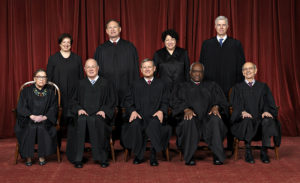The federal judiciary isn’t political? It isn’t driven by partisan politics?
Excuse me while I bust out laughing.
There. Now I feel better.
Donald J. Trump reportedly has narrowed his short list of U.S. Supreme Court justice candidates to an even shorter list. It’s good to ask: Do you think the president is poring over written opinions, legal scholarship and the candidates’ judicial records to help him make this pick?
I don’t believe that’s the case.
Unlike some of his predecessors — namely Barack H. Obama, who taught constitutional law before entering politics — this president depends seemingly exclusively on the politics of the moment and on whether he likes whoever he might select for a lifetime appointment to a federal judgeship.
This is a big one, folks.
Roe v. Wade — the landmark 1973 ruling that made abortion legal — is on the line. Do you believe the president has studied the implications of that ruling, that he understands its legality?
Justice Anthony Kennedy’s pending retirement gives Trump the chance to make his second Supreme Court appointment. Think of this, too: It’s only a year and a half since he took office. How many more appointments do you think this president can make before his time is up?
Then there’s the question of whether the Senate should consider this appointment before the midterm election. Given the masterful obstruction that Senate Majority Leader Mitch McConnell performed to block Obama’s selection of Merrick Garland to succeed the late Antonin Scalia, there might be a push to delay this vote into 2019. Don’t bet on it, though, given polling that suggests Americans want the Senate to proceed.
I have one more issue to raise quickly. Trump said he won’t ask his court candidates how they would vote on reproductive rights. Do you take him at his word?
Neither do I.
The drama is about to get real thick.
